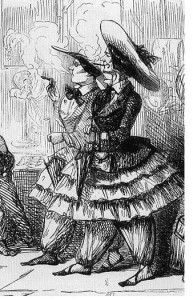MONDAY, 13 JUNE 2011
 People who smoke cigarettes tend to be thinner than non-smokers, and often gain weight once they quit [1]. Researchers at Yale University in the United States have investigated this phenomenon at the neurological level and presented their results in Science [2].
People who smoke cigarettes tend to be thinner than non-smokers, and often gain weight once they quit [1]. Researchers at Yale University in the United States have investigated this phenomenon at the neurological level and presented their results in Science [2].The team focused on neurons of the melanocortin system of the hypothalamus, a pathway of the brain known to be involved in the regulation of appetite. They found that nicotine binds to a specific receptor, known as α3β4, on pro-opiomelanocortin (POMC) neuronal cells. Binding of nicotine to this receptor leads to increased activity of the neuron and subsequent activation of another receptor, MC4R, in other neurons. Previous studies have demonstrated that activation of MC4R is critical in regulating food intake and energy expenditure.
Some smokers are discouraged from quitting because they fear they will gain weight, although the average gain is less than 10 pounds [3]. Nicotine gum or a patch may help, but could result in continued nicotine dependency. Because the mechanism identified in this study differs from those that contribute to nicotine reward and drug reinforcement, the research suggests that it may be possible to develop a drug that can help people to lose weight without having the addictive effects of nicotine.
Written by Robert Jones
References:
- http://www.ncbi.nlm.nih.gov/pmc/articles/PMC1646954/
- Mineur, Y. S., Abizaid, A., Rao, Y., Salas, R., DiLeone, R. J., Gündisch, D., Diano, S., et al. (2011). Nicotine decreases food intake through Activation of POMC Neurons. Science, 332(6035), 1330 -1332. doi:10.1126/science.1201889
- http://www.nida.nih.gov/newsroom/11/NR6-09.html
